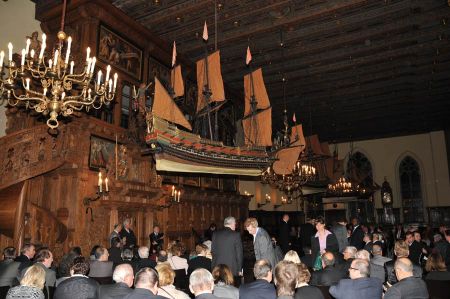90 years - Turkish national holiday in Bremen City Hall
- Written by Portal Editor
The strong connections between Turks and Germans, at least as far as interpersonal relationships are concerned, were once again very present on the occasion of the 90th anniversary of the Turkish Republic, which took place in Bremen as part of a ceremony in the ballroom of the town hall.
For years there has been close cooperation between the Turkish associations and organizations and the city administration of the Hanseatic City of Bremen, which was appropriately acknowledged during the various greetings. Last but not least, reference should once again be made at this point to the town twinning between Bremen and Izmir, which culminated this year with the visit of Bremen's Lord Mayor Jens Böhrnsen during the German-Turkish Friendship Festival in Izmir.
Mayor of the Free Hanseatic City of Bremen Karoline Linnert
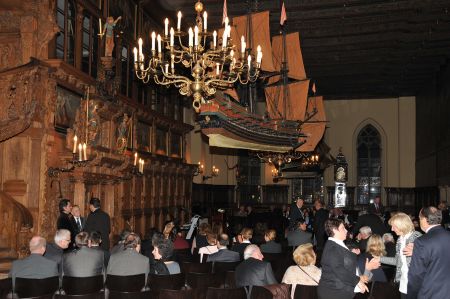 In what is probably the most important room in the town hall, the Upper Hall, which is 41 meters long and 8 meters wide with a room height of 8 meters and is one of the largest unsupported profane halls of the Middle Ages in Northern Europe, a truly worthy space for the ceremony was found been. As soon as you enter the hall, your eyes involuntarily stop at the ceiling, the walls, and the entire interior design in fascination. The flat, ornamentally painted wooden ceiling, held by an artistic construction made of mighty oak trunks, is an example of excellent craftsmanship.
In what is probably the most important room in the town hall, the Upper Hall, which is 41 meters long and 8 meters wide with a room height of 8 meters and is one of the largest unsupported profane halls of the Middle Ages in Northern Europe, a truly worthy space for the ceremony was found been. As soon as you enter the hall, your eyes involuntarily stop at the ceiling, the walls, and the entire interior design in fascination. The flat, ornamentally painted wooden ceiling, held by an artistic construction made of mighty oak trunks, is an example of excellent craftsmanship.
33 imperial medallions, from Karl to Sigismund, but painted over in 1857, adorn the richly ornamented ceiling and thus propagate the status of a city directly subject to the empire. Models of orlog ships (warships that accompanied merchant convoys) from the years 1545, 1650, 1770 and 1779 hang from the ceiling. The miniature cannons of some ships were even used to fire cannon salutes at festivals. The chandelier with the double eagle was a gift from the Schütting in 1869. The furnishings and history of the upper hall alone are enough for an extensive visit, which we will certainly do again later.
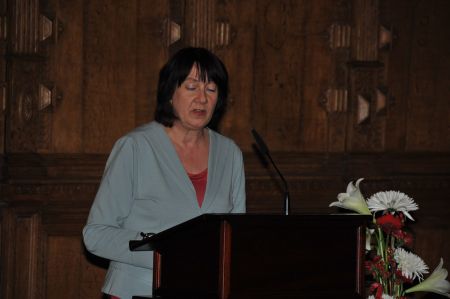 The mayor of the Free Hanseatic City of Bremen, Karoline Linnert, began the festive part of the evening by welcoming the guests and giving a brief look back at the long-standing cooperation between Turkish and German citizens in the city of Bremen, which was not least supported and honored by many political measures. In particular, the state treaty between the city and the Muslims living here, which, among other things, equates the three Islamic holidays with the day of repentance and prayer, was explained in her welcome speech.
The mayor of the Free Hanseatic City of Bremen, Karoline Linnert, began the festive part of the evening by welcoming the guests and giving a brief look back at the long-standing cooperation between Turkish and German citizens in the city of Bremen, which was not least supported and honored by many political measures. In particular, the state treaty between the city and the Muslims living here, which, among other things, equates the three Islamic holidays with the day of repentance and prayer, was explained in her welcome speech.
A greeting followed from Mehmet Günay, Consul General of the Republic of Turkey, who, in addition to emphasizing the positive cooperation, also gave a short presentation on figures and data on the founding of the Republic. Between the lectures, Grup Pamukkale provided the musical framework for the event. In her concluding speech, the Honorary Consul of the Republic of Turkey, Yasemin Vierkötter, went into further goals of the cooperation before the applauding audience left the historic Upper Hall to enjoy Turkish-German conversation at the buffet.
On the history of the Republic of Türkiye
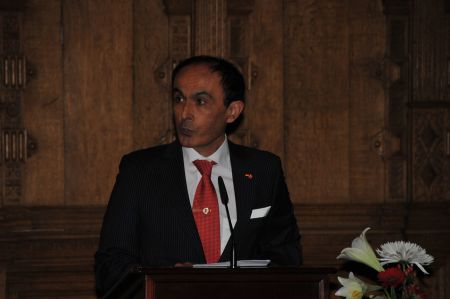 The history of the Republic of Turkey began on October 29, 1923 with its proclamation by Mustafa Kemal Pasha and the transfer of the capital from İstanbul to Ankara.
The history of the Republic of Turkey began on October 29, 1923 with its proclamation by Mustafa Kemal Pasha and the transfer of the capital from İstanbul to Ankara.
This was preceded by the actual collapse of the Ottoman Empire in World War I, the Turkish War of Independence and the deposition of Sultan Mehmed VI. His successor Abdülmecid II only bore the title of caliph.
With his deposition on March 3, 1924, the Ottoman dynasty was finally disempowered.
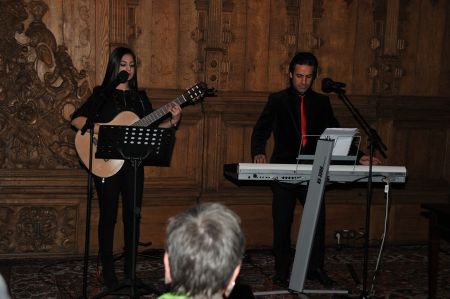 During his tenure, Ataturk carried out far-reaching reforms in the political and social system that were to transform Turkey into a modern, secular and western-oriented state. In 1922 the Sultanate was abolished and on October 29, 1923 the Caliphate. On April 20, 1924, a new constitution came into force which, among other things, abolished the religious courts.
During his tenure, Ataturk carried out far-reaching reforms in the political and social system that were to transform Turkey into a modern, secular and western-oriented state. In 1922 the Sultanate was abolished and on October 29, 1923 the Caliphate. On April 20, 1924, a new constitution came into force which, among other things, abolished the religious courts.
In 1925, a hat reform banned the fez (traditional Turkish men's headgear). Later the veil was banned for women and coeducation was introduced. In the same year, both the Islamic calendar and the Rumi calendar used at the same time were abolished and replaced by the Gregorian calendar. The metric system was also introduced.
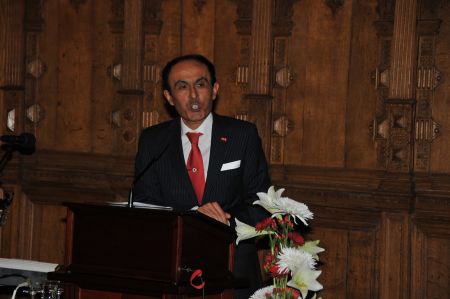 In the years that followed, entire legal systems were adopted from European countries and adapted to Turkish conditions. In 1926, Swiss private law and its sources – the Civil Code and the Code of Obligations – and thus monogamy, divorce law and equality between men and women were adopted. German commercial law and Italian criminal law followed. Constitutional changes in 1928 and 1937 anchored secularism and laicism in the constitution, and in 1928 the Arabic script was replaced by Latin. On December 11, 1934, Law No. 2599 gave women the right to vote and stand for election.
In the years that followed, entire legal systems were adopted from European countries and adapted to Turkish conditions. In 1926, Swiss private law and its sources – the Civil Code and the Code of Obligations – and thus monogamy, divorce law and equality between men and women were adopted. German commercial law and Italian criminal law followed. Constitutional changes in 1928 and 1937 anchored secularism and laicism in the constitution, and in 1928 the Arabic script was replaced by Latin. On December 11, 1934, Law No. 2599 gave women the right to vote and stand for election.
Atatürk's actions were based on the ideology of Kemalism, which is based on six principles: Turkish nationalism, secularism, republicanism, statism, revolutionism and populism.
The reforms were not accepted without resistance by traditionalist forces. On February 13, 1925, the Kurdish minority under Sheikh Said revolted. It was a mixture of Kurdish nationalism and clerical opposition to Turkey's secularization. Like other uprisings, the uprising was violently suppressed by the military.
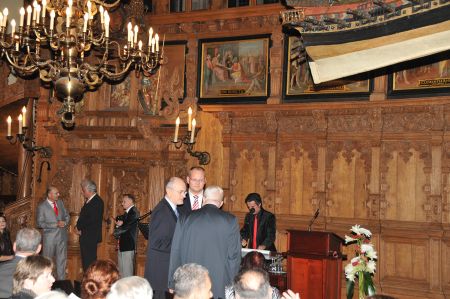 Atatürk's reforms brought about far-reaching social, cultural and economic changes that continue to shape the country to this day. Nevertheless, he had retained elements of the Ottoman Empire, such. B. the authoritarian state leadership or the supremacy of the military and the civil service.
Atatürk's reforms brought about far-reaching social, cultural and economic changes that continue to shape the country to this day. Nevertheless, he had retained elements of the Ottoman Empire, such. B. the authoritarian state leadership or the supremacy of the military and the civil service.
After Atatürk's death in 1938, his companion İsmet İnönü became President. Inönü endeavoured to continue the modernization of Turkey and to maintain foreign policy neutrality. He achieved the last territorial change through diplomatic channels: Hatay (Sanjak Alexandrette), a French mandate area since 1920, became an independent republic in 1938 and a Turkish province in 1939 (capital: İskenderun).
An example of German-Turkish friendship: Honour for Angela Merkel
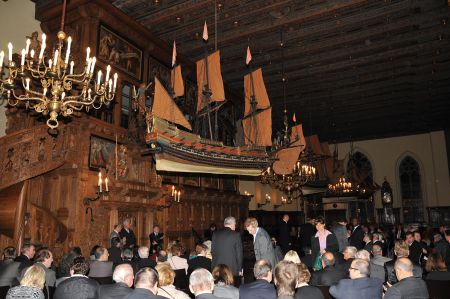 Chancellor and CDU Chairwoman Angela Merkel received this year's Kybele Prize 2013. This year, the German-Turkish Federation (DTF) honours Angela Merkel's "efforts in integration" with this annual award.
Chancellor and CDU Chairwoman Angela Merkel received this year's Kybele Prize 2013. This year, the German-Turkish Federation (DTF) honours Angela Merkel's "efforts in integration" with this annual award.
"We stand for a harmonious and peaceful coexistence of peoples in our society," said Cihan Sendan, national chairman of the association.
With the award, the DTF wants to show respect to Merkel and her office, according to Sendan.
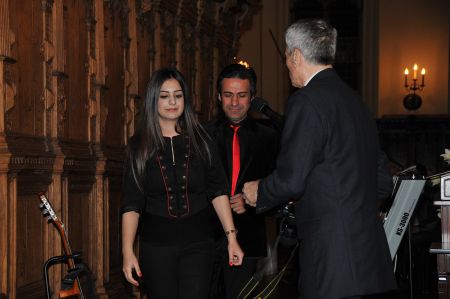 The CDU chairwoman called for "making it clear again and again" how great the respect for people of Turkish origin is in Germany. The country must integrate immigrants more than before. "It is not enough to be a country with a high migration rate, we must also become a country of integration," said Merkel. Increasing diversity means enrichment, integration strengthens social cohesion. Around 16 million people with a migration background live in Germany, and that is a permanent reality. That is why the integration efforts must be intensified.
The CDU chairwoman called for "making it clear again and again" how great the respect for people of Turkish origin is in Germany. The country must integrate immigrants more than before. "It is not enough to be a country with a high migration rate, we must also become a country of integration," said Merkel. Increasing diversity means enrichment, integration strengthens social cohesion. Around 16 million people with a migration background live in Germany, and that is a permanent reality. That is why the integration efforts must be intensified.
Please read as well:
